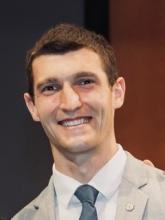Fearless Initiative: From the Classroom to the Edge of Combat With Jason Arens
Few people leap into national security work quite like Jason Arens. Just three months out of graduate school, he found himself deploying to Eastern Afghanistan in August 2012. Tasked with deploying early instances of Palantir Technologies Inc.’s emerging data analytics platform, Arens provided critical data for frontline troops, analysts and senior officers to scale military operations across the country. From there, he went on to serve across a spectrum of U.S. government departments and agencies, including the U.S. Department of Homeland Security, FBI and U.S. Department of State, both as a civilian and contractor. He is currently supporting the U.S. government in Tampa, Florida.
For young professionals eyeing a career in national security, Arens’ journey offers a powerful blueprint for success. Central to his advice is one transformative idea: embrace fearless initiative. When my colleagues and I were fortunate to interview him, Arens shared lessons from his early career in national security and why he believes fearless initiative is an essential—but often overlooked—skill for young professionals.
Confront Hard Problems
According to Arens, the most undervalued quality in the national security workforce is the willingness to step up when facing hard problems.
“You can’t be afraid to take the lead on hard problems, whether it’s technology, process or organizational culture,” he asserted.
For young professionals, this means actively seeking opportunities that push you out of your comfort zone instead of waiting for perfect circumstances. Arens' early assignment in Afghanistan is a prime example. Despite the daunting environment, his readiness to tackle the unknown enabled him to develop both technical skills and leadership qualities that would shape his early career.
Say Yes Early and Often
Jason advised young professionals to say “yes” to opportunities even when they seem intimidating. He posited that early career breakthroughs often come from taking risks, as demonstrated by his proactive approach to solving operational challenges.
When faced with data discontinuity issues among military units, Arens transformed a potential setback into an opportunity for innovation. This decisive action not only enhanced operational efficiency but also set him apart as a forward-thinking leader. His experience serves as a reminder that the willingness to engage with challenges head-on, especially in harsh, intimidating environments, is crucial for personal and professional growth.
From the Classroom to Combat
Arens credited his exposure to Palantir, while pursuing his master’s degree in security and intelligence studies at the University of Pittsburgh, as a “breakthrough” moment for him. This enabled him to learn on a training instance of Palantir, which furthered his understanding of the role advanced data analytics can play in the national security space and postured him for his first job opportunity out of school—a deployment to Eastern Afghanistan.
Fearless initiative is not a one-off burst of courage but a continuous practice of learning through action. In national security, where the stakes are high and the environment is ever-changing, theoretical knowledge must be supplemented by practical experience. Arens' hands-on approach taught him lessons that classroom learning alone could never provide.
For young professionals, taking on real-world challenges—be it managing new technologies or streamlining processes—builds a robust foundation for a successful career.
Commitment to Innovation and Networking
National security is a field that demands ongoing innovation. Arens emphasized the ability to question the status quo and drive change is essential not only at the start of your career but throughout your professional journey. Arens' career reflects his commitment to addressing the technological challenges faced by the U.S. defense and intelligence communities. In just over a decade, Arens led multiple deployments of Palantir and other innovative technologies to support critical missions for thousands of U.S. military, law enforcement and intelligence officers globally.
Equally as important is building a supportive professional network. Arens' involvement with AFCEA’s Emerging Professionals in the Intelligence Community (EPIC) Committee underscores the value of connecting with experienced mentors and peers. He said he believes the EPIC Committee’s strength lies in the thought leadership and collaboration it fosters through connecting early to mid-career professionals with “titans” of the defense and intelligence communities, including former agency directors, senior executives and military leaders.
Create Your Own Opportunities
Ultimately, Arens’ message to young professionals is clear: Fearless initiative is a lifelong asset. It is the spark that ignites early career growth and continues to drive long-term success. Don’t wait for opportunities; create them. Arens said he believes fearless initiative can be a guiding force in your career, paving the way for innovation, resilience and success in the ever-evolving field of national security.

Josh Monacelli is a member of AFCEA’s Emerging Professionals in the Intelligence Community (EPIC) Committee. He currently serves as a lead cyber threat analyst for the U.S. Department of Defense. He received his master's degree in science and technology intelligence from the National Intelligence University in 2023, and his bachelor's degree in international affairs from The George Washington University’s Elliott School of International Affairs in 2019. Monacelli conducted a virtual interview with Jason Arens to discuss his early career insights and lessons learned with rising national security professionals.

Jason Arens is a member of AFCEA’s Emerging Professionals in the Intelligence Community (EPIC) Committee. This article weaves together the interview questions asked and Arens' responses from the discussion, which have been lightly edited for clarity and flow. His views expressed in the interview and subsequent article by Josh Monacelli are his own and do not reflect the official policy or position of Premise Data or the U.S. government.





Comments